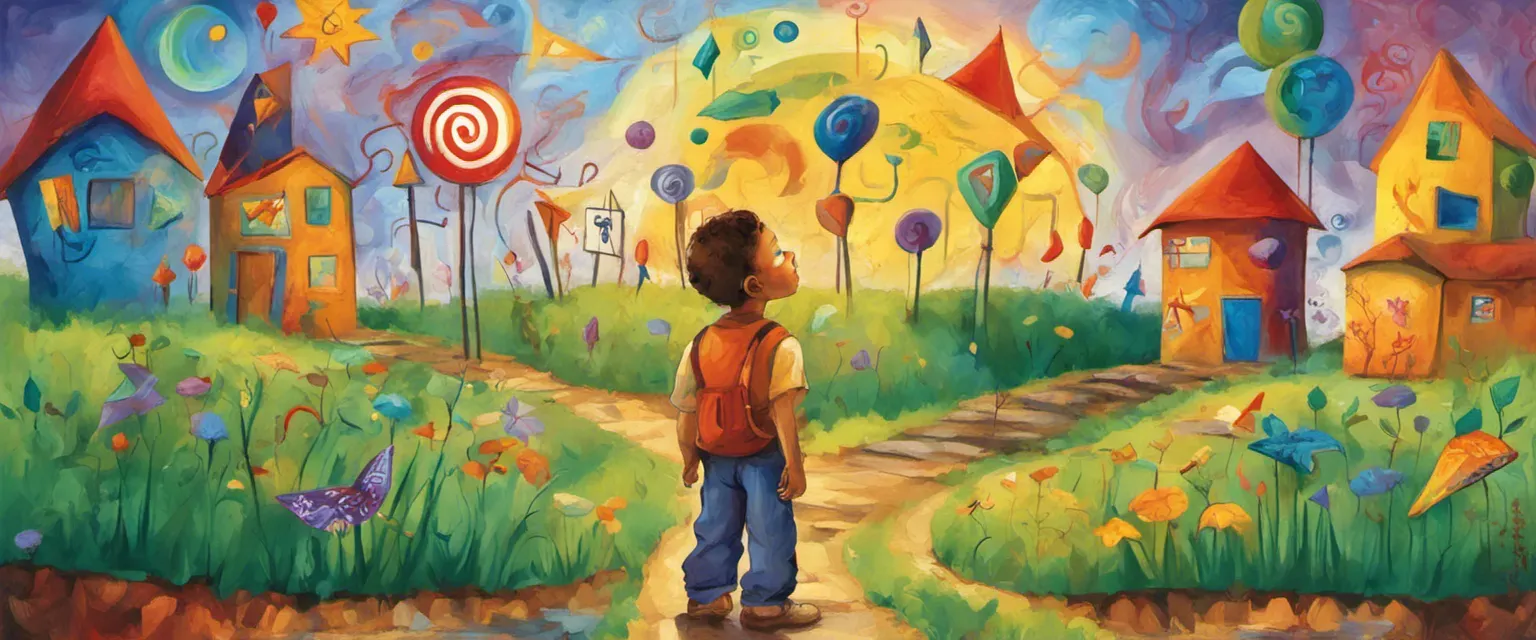The Drama of the Gifted Child: Understanding Emotional Struggles
"The Drama of the Gifted Child" explores the psychological challenges faced by highly sensitive individuals who were raised in emotionally neglectful or abusive environments.
Chapter 1 What's The Drama of the Gifted Child
The book "The Drama of the Gifted Child" by Alice Miller, originally published as "Das Drama des begabten Kindes und die Suche nach dem wahren Selbst" in 1979, explores the consequences of childhood emotional neglect and trauma. In the book, Miller analyzes the impact of parents who may have appeared loving and caring but failed to provide genuine emotional support to their children. The author argues that this kind of upbringing can lead to personality disorders and other psychological difficulties in adulthood. Miller also advocates for inner healing and self-discovery as means to overcome these effects. Overall, the book provides insight into the emotional lives of gifted children and the long-term consequences of emotional neglect.
Chapter 2 Why is The Drama of the Gifted Child Worth Read
The Drama of the Gifted Child by Alice Miller is worth reading for several reasons:
- Insightful examination of childhood trauma: Alice Miller explores the impact of childhood trauma on individuals and the long-lasting effects it can have on their lives. She delves into how this trauma can affect a person's emotional and psychological development, and offers valuable insights into understanding and healing these wounds.
- Emphasis on emotional authenticity: Miller promotes the idea that true emotional health can only be achieved through honesty and authenticity. She encourages readers to face their suppressed emotions, confront painful experiences, and ultimately develop a genuine connection with their own feelings. This perspective can be highly valuable for individuals seeking personal growth and self-discovery.
- Examination of societal norms and expectations: Miller challenges societal norms and expectations that can inadvertently perpetuate emotional abuse and neglect. By critiquing cultural practices, she encourages readers to question and challenge the damaging aspects of their upbringing, thus empowering them to break free from unhealthy cycles.
- Focus on unconscious dynamics: The book highlights how unconscious dynamics within a family can contribute to emotional wounds. Miller's exploration of the unconscious allows readers to gain a deeper understanding of their own experiences and those of their family members, fostering empathy and compassion in the process.
- Practical advice and tools for healing: Throughout the book, Miller provides practical advice and strategies for healing childhood wounds. She offers insights into therapy techniques, communication skills, and self-reflection exercises, empowering readers to embark on their own healing journey.
Overall, The Drama of the Gifted Child is a thought-provoking and illuminating book that provides readers with valuable insights into the impact of childhood trauma and practical tools for healing. It offers a new perspective on emotional health and authenticity that can promote personal growth and foster a healthier understanding of oneself and others.
Chapter 3 The Drama of the Gifted Child Summary
The Drama of the Gifted Child by Alice Miller is a book that explores the psychological impact of childhood trauma and the ways in which it can shape an individual's adult life. Miller argues that many individuals who appear "gifted" or successful on the outside are actually suffering internally due to unresolved childhood wounds.
Miller begins the book by discussing the notion of the "gifted" child and how these children often develop a false self in order to meet the needs and expectations of their parents. She argues that this false self becomes a mask that individuals wear throughout their lives, preventing them from truly knowing and expressing their authentic selves.
The author then delves into the concept of narcissism and discusses how many parents inadvertently project their own unmet needs onto their children. She asserts that these children are often raised to be perfect, obedient, and high-achieving, at the expense of their own emotional well-being.
Miller goes on to explain the various ways in which individuals may cope with the trauma of their childhood, including by becoming overachievers, workaholics, or by developing addictions to drugs or alcohol. She emphasizes the importance of acknowledging and processing one's childhood pain in order to break free from these destructive patterns.
Throughout the book, Miller shares case studies and personal stories of individuals who have faced and overcome their childhood traumas. She provides practical advice for individuals looking to heal their inner child and offers hope for those who have been affected by their own upbringing.
In conclusion, The Drama of the Gifted Child by Alice Miller is a thought-provoking exploration of the lasting impacts of childhood trauma and the importance of healing and self-discovery. It offers a powerful message about the importance of acknowledging and healing from past wounds in order to live a fulfilled and authentic life.
Chapter 4 The Drama of the Gifted Child Author
Alice Miller, born as Alicija Englard on January 12, 1923, was a Swiss psychoanalyst and author known for her work on childhood trauma and its long-lasting impact on individuals. She passed away on April 14, 2010.
One of her most famous and influential books is "The Drama of the Gifted Child" (also published as "Prisoners of Childhood"). It was first released in German in 1979 under the title "Das Drama des begabten Kindes: Eine Um- und Fortschreibung." The book explores the concept of narcissism and how it arises from early childhood experiences. It delves into the emotional pain experienced by individuals who were seen as gifted or talented by their parents, but only valued for what they did rather than who they were as individuals.
Alice Miller published several other books during her career:
- "For Your Own Good: Hidden Cruelty in Child-Rearing and the Roots of Violence" (1980)
- "Thou Shalt Not Be Aware: Society's Betrayal of the Child" (1984)
- "The Untouched Key: Tracing Childhood Trauma in Creativity and Destructiveness" (1990)
- "Banished Knowledge: Facing Childhood Injuries" (1993)
- "Breaking Down the Wall of Silence: The Liberating Experience of Facing Painful Truth" (1997)
- "Paths of Life: Seven Scenarios" (1998)
- "The Truth Will Set You Free: Overcoming Emotional Blindness and Finding Your True Adult Self" (2001)
In terms of editions, it is subjective to determine the "best" edition of Alice Miller's books. However, for "The Drama of the Gifted Child," the 1981 English edition published by Basic Books is widely regarded as one of the most popular editions. It has been translated into numerous languages and has undergone several reprints and revisions over the years, ensuring its availability to a wider audience.
Chapter 5 The Drama of the Gifted Child Meaning & Theme
The Drama of the Gifted Child Meaning
"The Drama of the Gifted Child" by Alice Miller is a renowned psychological book that explores the psychological experiences and inner struggles of individuals who were defined as gifted children. Miller argues that gifted children often face emotional challenges and difficulties due to the unrealistic expectations placed upon them by their parents and society.
The book delves into the concept of "giftedness" and discusses how societal ideals often lead parents to project their unfulfilled ambitions and desires onto their children, leading to a lack of authentic self-expression. Miller emphasizes the importance of recognizing and understanding past traumas and the impact they have on a person's development. She argues that the suppression of emotions and the denial of one's authentic self often lead to a variety of psychological and interpersonal issues later in life.
Additionally, Miller explores the pattern of children becoming compliant and accommodating to the needs of their parents in order to gain love and acceptance. She suggests that this survival strategy can cause deep emotional wounds and impair a person's ability to form healthy relationships in adulthood.
Overall, "The Drama of the Gifted Child" examines the psychological and emotional complexities of gifted individuals and sheds light on the importance of self-discovery, healing past traumas, and embracing one's true self to lead a fulfilling and authentic life.
The Drama of the Gifted Child Theme
The theme of "The Drama of the Gifted Child" by Alice Miller is the impact of childhood trauma and the destructive roles that societal expectations, such as being a "gifted" child, can play in perpetuating this trauma.
Miller argues that many individuals who are considered "gifted" or high achievers often have a hidden history of emotional neglect or abuse during their childhood. These individuals may have been denied their authentic selves and forced to conform to societal expectations of being intelligent, mature, responsible, or talented. This pressure to meet these expectations can lead to emotional detachment and a lack of self-worth.
The book explores how these gifted children often develop different defense mechanisms like overachievement or perfectionism to cope with the emotional pain they experienced in childhood. However, these defense mechanisms ultimately hinder their personal growth and prevent them from forming authentic and fulfilling relationships.
The theme also emphasizes the importance of acknowledging and processing childhood trauma, as well as breaking free from societal pressures and expectations. Miller encourages readers to reevaluate their own childhood experiences and societal roles they have adopted in order to heal and reclaim their authentic selves.
In conclusion, the theme of "The Drama of the Gifted Child" is the harmful effects of childhood trauma and the need for individuals to confront and transcend societal expectations in order to heal and live authentically.
Chapter 6 Other Accessible Resources
- "The Body Never Lies: The Lingering Effects of Cruel Parenting" - This is another book by Alice Miller that delves further into the topic of childhood trauma and its impact on the body and psyche.
- The Drama of the Gifted Child: The Search for the True Self, Revised Edition Paperback – January 1, 1997
- "Running on Empty: Overcoming Your Childhood Emotional Neglect" by Jonice Webb - Webb's book focuses on the issue of emotional neglect in childhood and its long-term repercussions, offering guidance on how to address and heal from this experience.
- "Adult Children of Emotionally Immature Parents: How to Heal from Distant, Rejecting, or Self-Involved Parents" by Lindsay C. Gibson - This book examines the effects of emotionally immature parents and provides insights and strategies for healing and establishing healthy boundaries.
- "The Drama Triangle: Breaking the Cycle of Toxic Relationships" by Stephen Karpman - While not specifically about Miller's work, this book explores the dynamics of toxic relationships, including the roles of victim, perpetrator, and rescuer, and offers guidance on breaking free from these patterns.
- "The Intuitive Parent: Why the Best Thing for Your Child Is You" by Stephen Camarata - This book offers a different perspective on parenting by emphasizing the importance of connecting with one's intuition and fully engaging with children's needs, emotions, and development.
- "Parenting from the Inside Out: How a Deeper Self-Understanding Can Help You Raise Children Who Thrive" by Daniel J. Siegel and Mary Hartzell - This book explores the relationship between a parent's own history, self-awareness, and their ability to provide nurturing and supportive parenting.
These resources can help broaden the understanding of the topics discussed in "The Drama of the Gifted Child" and provide additional insights and strategies for healing and growth.
Chapter 7 Quotes of The Drama of the Gifted Child
The Drama of the Gifted Child quotes as follows:
- "To be fully seen by somebody, then, and be loved anyhow—this is a human offering that can border on miraculous."
- "The true opposite of depression is not happiness, but vitality."
- "We retained the unsolved and unsolvable burdens of their lives and have made them our own."
- "The truth about our childhood is stored up in our body, and although we can repress it, we can never alter it. Our intellect can be deceived, our feelings manipulated, and conceptions confused, and our body tricked with medication. But someday our body will present its bill, for it is as incorruptible as a child who, still whole in spirit, will accept no compromises or excuses, and it will not stop tormenting us until we stop evading the truth."
- "The drama of the gifted child is that they are gifted as long as they are not themselves."
- "There is no such thing as a baby, there is only a baby and someone."
- "The more love and understanding she finds, the less need there is for her to connect her adult life with the pain of her childhood."
- "Only when we love ourselves fully, accept ourselves with all our flaws and failures, can we truly love others and accept them without judgment."
- "We need to understand that our feelings are our most valuable resources, that they are the doorway to our true selves."
- "Our original wants and needs, our real selves, are easily lost in the struggle of pleasing others."
Chapter 8 Similar Books Like The Drama of the Gifted Child
- "Emotional Intelligence: Why It Can Matter More Than IQ" by Daniel Goleman
Daniel Goleman delves into the fascinating realm of emotional intelligence and its impact on every aspect of our lives. Grounded in scientific research, this book illustrates the importance of emotional awareness, empathy, and self-regulation, and how they can contribute to personal and professional success.
- "Man's Search for Meaning" by Viktor E. Frankl
This profound memoir by Viktor Frankl, a Holocaust survivor and psychiatrist, delves into the search for meaning in life. By recounting his experiences in Nazi concentration camps, Frankl explores the concept of human resilience, finding purpose, and the power of one's mindset. A timeless book that inspires reflection and offers valuable insights into the human condition.
- "The Body Image Workbook: An Eight-Step Program for Learning to Like Your Looks" by Thomas F. Cash
Body image issues affect many individuals, impacting their self-esteem and overall well-being. In this workbook, Thomas F. Cash offers an evidence-based and practical approach to improving body image. With insightful exercises and strategies, this book can be a valuable resource for anyone seeking to develop a healthier relationship with their body.
- "The Gifts of Imperfection: Let Go of Who You Think You're Supposed to Be and Embrace Who You Are" by Brené Brown
Renowned researcher and storyteller Brené Brown explores the power of vulnerability in this transformative book. Through personal anecdotes, research findings, and actionable advice, Brown encourages readers to let go of perfectionism and embrace their authentic selves. This book provides essential guidance for anyone seeking to cultivate self-compassion and cultivate a more fulfilling life.
- "Attached: The New Science of Adult Attachment and How It Can Help You Find - and Keep - Love" by Amir Levine and Rachel S. F. Heller
Attachment theory offers invaluable insights into our relationships and how we connect with others. In this book, Amir Levine and Rachel S. F. Heller explain the different attachment styles and their implications for adult relationships. With practical tips and real-life examples, this book is both informative and helpful for anyone striving to foster healthier and more fulfilling connections with their partners.





